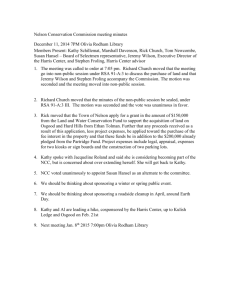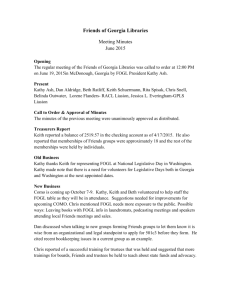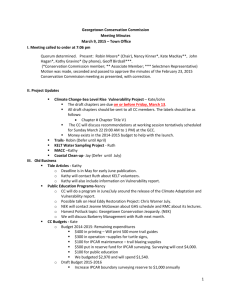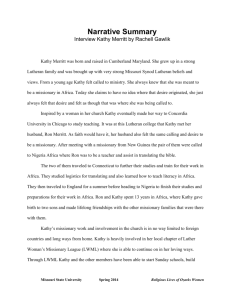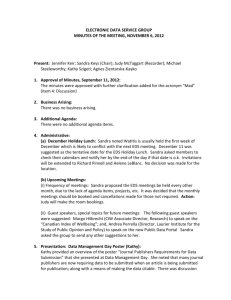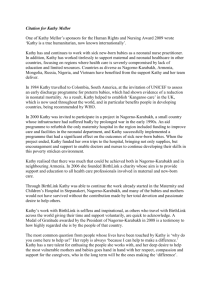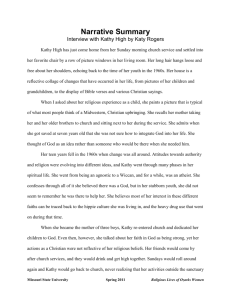Lesson 4
advertisement
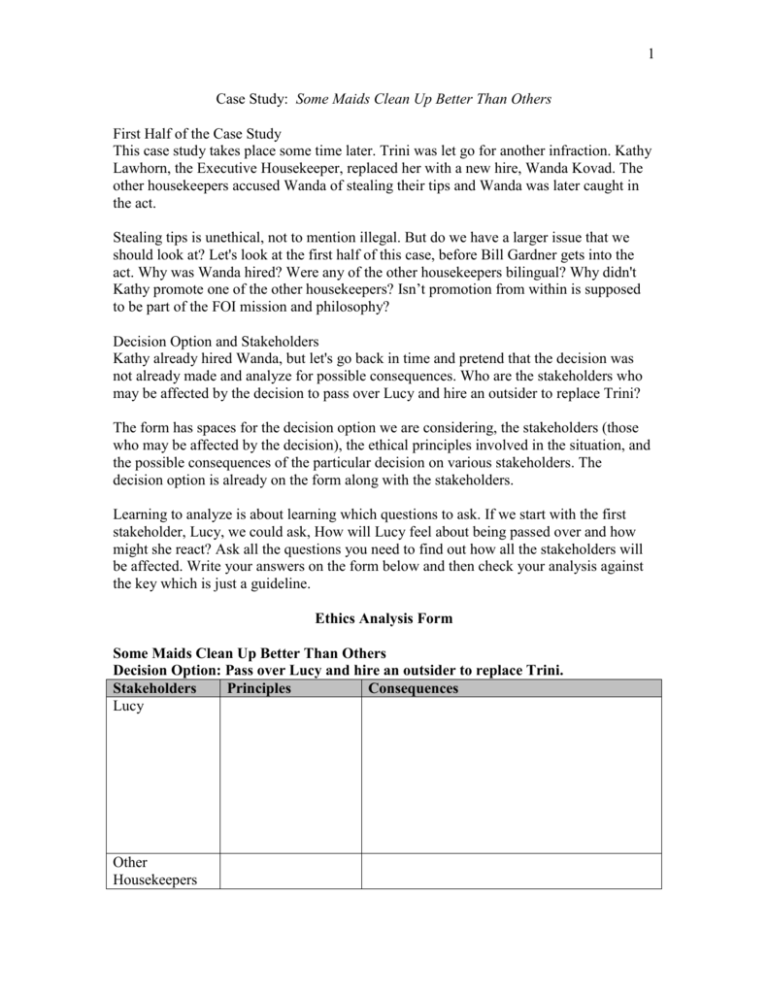
1 Case Study: Some Maids Clean Up Better Than Others First Half of the Case Study This case study takes place some time later. Trini was let go for another infraction. Kathy Lawhorn, the Executive Housekeeper, replaced her with a new hire, Wanda Kovad. The other housekeepers accused Wanda of stealing their tips and Wanda was later caught in the act. Stealing tips is unethical, not to mention illegal. But do we have a larger issue that we should look at? Let's look at the first half of this case, before Bill Gardner gets into the act. Why was Wanda hired? Were any of the other housekeepers bilingual? Why didn't Kathy promote one of the other housekeepers? Isn’t promotion from within is supposed to be part of the FOI mission and philosophy? Decision Option and Stakeholders Kathy already hired Wanda, but let's go back in time and pretend that the decision was not already made and analyze for possible consequences. Who are the stakeholders who may be affected by the decision to pass over Lucy and hire an outsider to replace Trini? The form has spaces for the decision option we are considering, the stakeholders (those who may be affected by the decision), the ethical principles involved in the situation, and the possible consequences of the particular decision on various stakeholders. The decision option is already on the form along with the stakeholders. Learning to analyze is about learning which questions to ask. If we start with the first stakeholder, Lucy, we could ask, How will Lucy feel about being passed over and how might she react? Ask all the questions you need to find out how all the stakeholders will be affected. Write your answers on the form below and then check your analysis against the key which is just a guideline. Ethics Analysis Form Some Maids Clean Up Better Than Others Decision Option: Pass over Lucy and hire an outsider to replace Trini. Stakeholders Principles Consequences Lucy Other Housekeepers 2 Kathy (Decision Maker) Housekeeping Department/FOI Ethical Principles The Ethical Principles are listed below. Which of the principles are violated by Kathy's decision to pass over Lucy and hire someone from outside FOI? The probabilities of any of these negative consequences happening may be very low in this situation. Why? (Lucy and the other Spanish-speaking housekeepers may not expect to get promoted. They may be used to getting passed over in favor of Anglos. They may just accept discrimination and keep on going.) If none of the bad consequences actually happen does that mean it's okay to violate ethical principles? What do you think of Kathy’s job performance in the various segments of the case that you have read? Do you have a lot of respect for her? Would you like to be a manager like her? What would you do different? What would you do if you were the G.M. and Kathy was one of your department heads? As management we are responsible for helping our management team be as effective as possible. How might you do this in this case? Second Half of the Case Study The second half of Some Maids Clean Up Better Than Others involves Bill Gardner hiding inside the dumb waiter closet trying to catch Wanda Kovad stealing a 3 housekeeper's tip. Kathy made a decision to have Bill Gardner hide in the dumb waiter closet to try and catch Wanda stealing the marked $20 bill. Is there anything wrong with that decision? Is it unethical? Go down the list of the principles. Kathy and Bill sort of set Wanda up but was it entrapment? Did they do anything to tempt her to do something wrong? (Well . . . yes, but it was reasonable. What were the alternatives? Let Wanda keep stealing tips?) Could they have come up with a better way to catch Wanda? Let's consider the ethics of not hiding in the closet and catching Wanda. If Lucy's accusation had been ignored and Wanda was allowed to continue stealing tips, would any of the ethical principles be violated? (Most of them would be violated.) Conclusion Most of us would rather not have to deal with problems like employee theft. Good management - - professional management - - is proactive and strives to avoid problems by making good decisions in the first place. Any decisions that violate ethical principles are more apt to have negative consequences. We determined earlier that it was important for managers of diverse employees to have the skills necessary to effectively communicate with employees. Being able to speak the same language would be beneficial. Kathy was deficient in this area. Whose fault is that? Who hired Kathy? This whole situation would never have arose had a more qualified person been hired for the Executive Housekeeper position to begin with. But, Kathy's there. What should they do to avoid further problems? Trini is gone. Wanda is most likely gone. Should Kathy be fired? (No, she was the mistake of upper management.) Should Lucy be promoted? Would there be any problems with that? What should be done about Kathy's lack of Spanish language skills? (Maybe require her to study Spanish?) And what should they do in the meantime until Kathy can communicate effectively with her staff? No decisions in management, or maybe in life, are without consequences. One thing leads to another. The idea is to avoid negative consequences. They are not good for anyone. Positive consequences are much better and considerably less painful. We can avoid negative consequences by making good decisions that violate none of the ethical principles. It’s that simple. Ethical Principles for Hospitality Managers Honesty: Hospitality managers are honest and truthful. They do not mislead or deceive others by misrepresentations. Integrity: Hospitality managers demonstrate the courage of their convictions by doing what they know is right even when there is pressure to do otherwise. 4 Trustworthiness: Hospitality managers are trustworthy and candid in supplying information and in correcting misapprehensions of fact. They do not create justifications for escaping their promises and commitments. Loyalty: Hospitality managers demonstrate loyalty to their companies in devotion to duty and loyalty to colleagues by friendship in adversity. They avoid conflicts of interest; do not use or disclose confidential information; and should they accept other employment, they respect the proprietary information of their former employer. Fairness: Hospitality managers are fair and equitable in all dealings; they do not abuse power arbitrarily nor take undue advantage of another’s mistakes or difficulties. They treat all individuals with equality, with tolerance for and acceptance of diversity and with an open mind. Concern and Respect for Others: Hospitality managers are concerned, respectful, compassionate and kind. They are sensitive to the personal concerns of their colleagues and live the “Golden Rule.” They respect the rights and interest of all those who have a stake in their decisions. Commitment to Excellence: Hospitality managers pursue excellence in performing their duties and are willing to put more into their job than they can get out of it. Leadership: Hospitality managers are conscious of the responsibility and opportunities of their position of leadership. They realize that the best way to instill ethical principles and ethical awareness in their organizations is by example. They walk their talk! Reputation and Morale: Hospitality managers seek to protect and build the company’s reputation and the morale of its employees by engaging in conduct that builds respect and by taking whatever actions are necessary to correct or prevent inappropriate conduct of others. Accountability: Hospitality managers are personally accountable for the ethical quality of their decisions as well as those of their subordinates. KEY - Ethics Analysis Form Some Maids Clean Up Better Than Others Decision Option: Pass over Lucy and hire an outsider to replace Trini. Stakeholders Principles Consequences Lucy Lucy deserves the promotion and could feel it was unfair to get passed over. She could tell others in the department if she was unhappy about getting 5 Other Housekeepers Kathy (Decision Honesty Maker) Integrity Trustworthiness Loyalty Fairness Concern & Respect for Others Commitment to Excellence Leadership Reputation & Morale Accountability Housekeeping Department/FOI passed over, and morale could drop. She could feel less loyalty to FOI and maybe look for another job. She may lose respect and trust for Kathy. Other housekeepers might think it is unfair that Lucy, who has seniority and has been doing some of the additional tasks anyway, was passed over and the job given to an outsider. Morale, loyalty to the company, and trust and respect for Kathy could all diminish which could have a negative effect on cooperation, attitude, and turnover. Because she can't speak Spanish, Kathy is considering passing over a deserving employee and hiring outside even though Lucy is qualified and company policy is to promote from within. Lucy and/or other housekeepers could see this as unfair which could negatively affect morale along with Kathy's ability to manage. Turnover could increase. The housekeepers could tell family and friends and the reputation of FOI housekeeping as a good place to work could be tarnished. This could have a negative effect on recruiting new housekeepers. Heidi, Kathy's supervisor, and possibly John (the G.M.) could become aware that Kathy's management is ineffective. This could jeopardize Kathy's tenure at FOI. If morale falls, performance could be negatively affected. Productivity could fall, turnover could rise, and guests could ultimately be dissatisfied. If the reputation of FOI Housekeeping as a good place to work is tarnished, it could be more difficult to recruit and hire good housekeepers. 6
